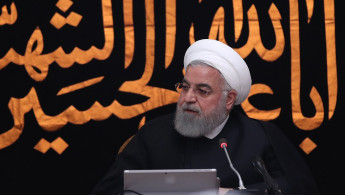Iranian president urges US to ‘put warmongers aside’ following Bolton dismissal
Iran's president urged the US on Wednesday to "put warmongers aside" as tensions roil the Persian Gulf amid an escalating crisis between Washington and Tehran in the wake of the collapsing nuclear deal with world powers.
Hassan Rouhani's remarks signalled approval of President Donald Trump's abrupt dismissal of John Bolton as national security adviser, a man routinely pilloried by Iranian Foreign Minister Mohammad Javad Zarif as part of a "B Team" that targeted Iran.
Bolton had for years been critical of Tehran and once promised an Iranian exile group that they'd be celebrating the overthrow of Iran's government this year.
Bolton's departure also comes amid speculation about Trump potentially meeting Rouhani during the upcoming U.N. General Assembly this month in New York. Whether such a meeting materializes, however, remains in question, though Iranian comments Wednesday seemed to suggest Tehran would be willing to pin hostilities on the departing Bolton rather than Trump himself.
Rouhani spoke after a Cabinet meeting Wednesday, a day that saw all major newspapers in Iran cover Bolton's departure. The pro-reform Shargh daily newspaper had one large headline that read: "Bolton: A scapegoat for Iran?"
"Americans have to realize that warmongering and warmongers are not to their benefit," the Iranian president said in televised remarks. "They should not only abandon warmongering but also abandon their maximum pressure policy."
Rouhani, in a phone call with French President Emmanuel Macron later Wednesday, repeated his position that if Europe finalizes a way for Iran to sell its oil, Iran would return to the nuclear deal's commitments. He also reiterated that lifting U.S. sanctions would bring Tehran back to the negotiating table with world powers, but the post to his official website detailing the call with Macron did not elaborate on what might be up for negotiation. Rouhani said as long as sanctions remain, "negotiating with the U.S. makes no sense."
Ali Rabiei, a government spokesman, said after the meeting that Bolton's dismissal may help the U.S. have a "less biased" attitude toward Iran.
Though he stressed the dismissal was an internal U.S. issue, Rabiei called Bolton "the symbol of America's hawkish policies and its animosity toward Iran."
Last year, Trump pulled the U.S. out of the landmark 2015 nuclear deal that lifted sanction on Iran in exchange for caps on Iran's nuclear program. The U.S. administration later also intensified sanctions on Iran, slashing its sales of crude oil abroad and sending the country's economy into freefall.
In response, Iran has in recent months crept past the limits the nuclear deal imposed on uranium enrichment and its uranium stockpile. And over the weekend, Tehran announced it would use advanced centrifuges prohibited under the deal.
Meanwhile, mysterious attacks on oil tankers near the Strait of Hormuz, the downing of a U.S. military surveillance drone by Iran and other incidents across the wider Middle East have exacerbated the crisis in the region as Tehran tries to pressure Europe to find a way to sell crude oil abroad despite U.S. sanctions.





 Follow the Middle East's top stories in English at The New Arab on Google News
Follow the Middle East's top stories in English at The New Arab on Google News
![22 Arab countries at COP29 have rejected the targeting of fossil fuels [Getty]](/sites/default/files/styles/image_330x185/public/2024-11/GettyImages-2184289638.jpg?h=199d8c1f&itok=ptHl5bec)
![Dozens of people turned out for the funerals [Getty]](/sites/default/files/styles/image_330x185/public/2024-11/GettyImages-2185229760.jpg?h=e7c891e8&itok=1bctDcE6)
![The UAE is widely suspected of arming the RSF militia [Getty]](/sites/default/files/styles/image_330x185/public/2024-11/GettyImages-472529908.jpg?h=69f2b9d0&itok=Yauw3YTG)